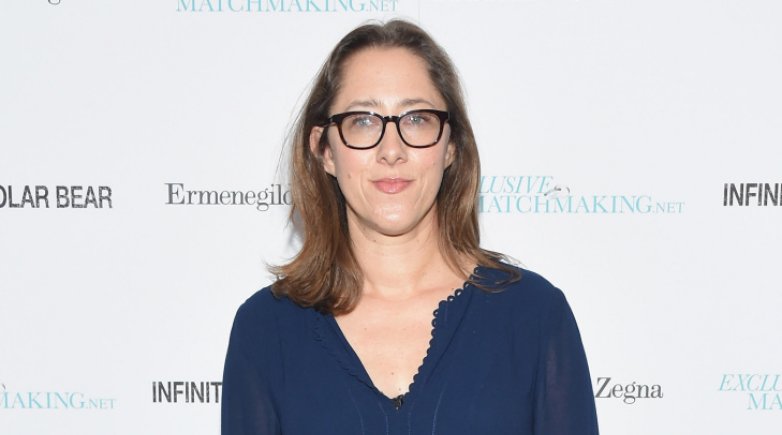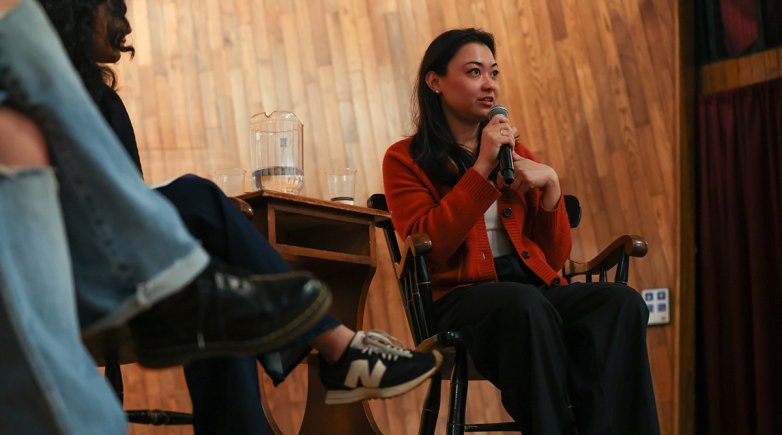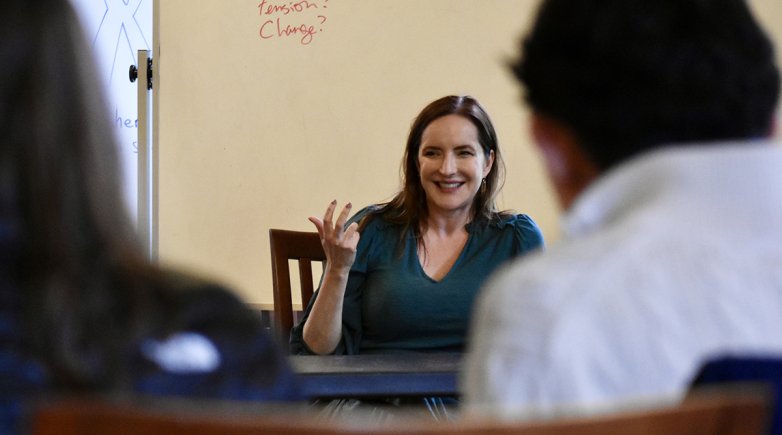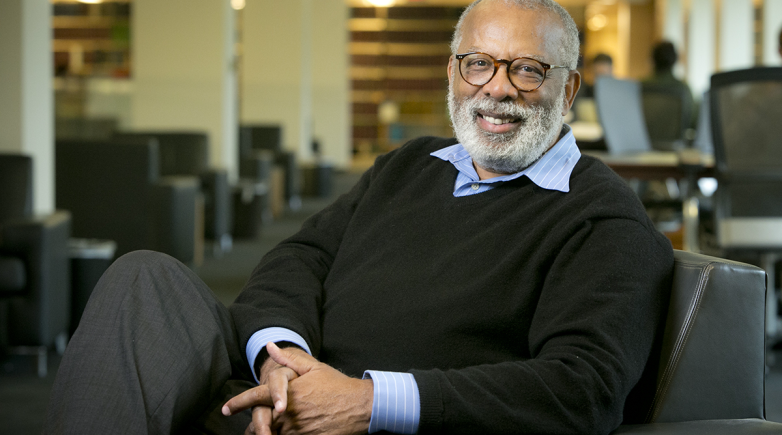Blending humor and heartbreak
A conversation with screenwriter Maya Forbes ’86.
Maya Forbes ’86 kicked off her professional career at 23 on the then-brand-new HBO comedy The Larry Sanders Show. Moving into filmmaking, the screenwriter (she’s one half of a dynamic writing duo with her husband, Wally Wolodarsky), producer and director has worked on an eclectic range of movies, including the animated Monsters vs. Aliens, the sweet-bitter-sweet canine chronicle A Dog’s Purpose and Jack Black’s The Polka King. She also wrote for the 10-episode television series The People vs. O.J. Simpson: American Crime Story. In 2014, Infinitely Polar Bear premiered at Sundance, sharing part of Forbes’ childhood story: While their mom attended grad school, Forbes and her sister, China ’88 (now a vocalist with the band Pink Martini), were primarily the responsibility of their father, who had bipolar disorder. It’s a deeply honest, deeply affecting love letter, driven by a palpable sense of empathy and compassion.
Q: How did you land at Garry Shandling’s The Larry Sanders Show?
Forbes: At Harvard, I was on the Lampoon, which is kind of a breeding ground for comedy writers. I actually wanted to be a playwright or to write movies. When I graduated, I was accepted into a screenplay program at Disney, so that got me to California. In those days, there were lots of network comedies that were very popular, so I wrote some spec scripts. I had a lot of people who had worked with me at the Lampoon who were able to say, “Oh yes, she’s funny, she’s good,” so that helped me get an agent. I met with Garry Shandling — a friend from college was already working there — and I really clicked with Garry. He liked my writing and he taught me well, too. He’d say, “I really like this joke, but you’ve buried it. You have to make sure that people understand what’s funny here; you have to bring it out into the open.”
Q: Looking at cast and credit lists, there’s a sense of friends-and-family to your work. Do you draw your writing strength from those people?
Forbes: I don’t know about my writing strength. Definitely, when you work with really talented people and you like them, it’s nice to work with them again. I learned that from Wes Anderson, who has a troupe of people he works with all the time. But for me, that’s more about the directing side. In the writing — I mean with my husband; we co-write all the time — I try to clear my head of real people. You’re trying to create something, and you don’t want to get boxed in to certain rhythms. You want to create new rhythms and voices and connections and relationships. Writing is more of a solitary act so I can focus on creating something fresh and new and different.
That’s what’s interesting — all the messiness and people making decisions you don’t necessarily agree with."
Q: So how does co-writing work with your husband?
Forbes: It’s always different. We both had solo writing careers, but we were always [reading] each other’s stuff and working on it together, and eventually it just made sense to co-write. He’s very good at keeping things in his head: He can just sit on the sofa and talk through a scene. I have to be looking at the screen or I don’t know where I am, so we collaborate that way, talking together. Sometimes we split things up: We both take a chunk of scenes, work on them separately and then go through them together. It’s an interesting process because you have an idea that you are passionate about and compelled by — you don’t usually come up with the spark of an idea together, right? Those things happen when you’re, say, on your own, walking your dog, and then you have this person you’re going to work on it with. So you’re already in the mode of trying to communicate your passion for something. It’s a good way to begin, to try to bring someone else in.
 When I wrote Infinitely Polar Bear, it was great to have Wally help me filter my memories, express them in ways that other people would understand and connect to. I’d been trying to write the story for years; when I finally understood how to do it, it took six weeks to write the actual script. I’d been trying to make everything likable and neat, thinking that maybe the parents should get divorced because people understand that. [It] makes sense. Our situation didn’t make sense; it was weird. But then I realized, “No, no, no. I’m just going to go toward the truth of it all,” because that’s what’s interesting — all the messiness and people making decisions you don’t necessarily agree with. If you’ve been working in Hollywood, you’re always trying to buck that idea that things need to be likable and relatable. It’s funny because all that likability makes people boring, bland and unlikable.
When I wrote Infinitely Polar Bear, it was great to have Wally help me filter my memories, express them in ways that other people would understand and connect to. I’d been trying to write the story for years; when I finally understood how to do it, it took six weeks to write the actual script. I’d been trying to make everything likable and neat, thinking that maybe the parents should get divorced because people understand that. [It] makes sense. Our situation didn’t make sense; it was weird. But then I realized, “No, no, no. I’m just going to go toward the truth of it all,” because that’s what’s interesting — all the messiness and people making decisions you don’t necessarily agree with. If you’ve been working in Hollywood, you’re always trying to buck that idea that things need to be likable and relatable. It’s funny because all that likability makes people boring, bland and unlikable.
Q: In Infinitely Polar Bear, the messiness and heartbreak were the charm.
Forbes: I wanted it to feel like life happening. I’m really proud of it. I missed my dad and I loved my dad and I feel like in our culture we’re always trying to stigmatize mental illness. But there are mentally ill people whom we all know, so many people we love who are wonderful people because they see the world differently. My dad had a tremendous compassion that came from his troubles.
Q: Do your storytelling abilities come from him?
Forbes: My father was a good storyteller, and my grandmother was a wonderful storyteller; my mom’s a really good storyteller, too. I feel really lucky that I was surrounded with that. The great thing about my father was that he was very self-deprecating, often telling a story about some foolish thing he’d done. One thing I loved about him in terms of me going into comedy is that he was very funny but he was not cruel or mean-spirited. His comedy came from silly things he’d done, his own foibles; he wasn’t trying to take other people down. That’s something that I really appreciate. It’s very easy to be funny at other people’s expense; it takes a different kind of grace to be funny at your own expense, and at the universe and how absurd it is.
Q: Do you and your sister exchange writing tips?
Forbes: We do! She often sends me her lyrics, and occasionally we’ve written songs together. And she’s always got some funny great line for a script. I used to tell her, “You only speak in usable dialogue.” She is like our dad in a way: She’s a good storyteller of her own misadventures.
Q: Finally, was there anything in particular at Exeter that impacted your work?
Forbes: When I got to Exeter, I didn’t take myself seriously as a writer. I thought I was just a silly bubblehead, a flibbertigibbet, which was one of my dad’s favorite words — he had great words! Then, in 11th grade I wrote an essay about my father — the beginning of my trying to figure out how to write about him — and my teacher, Mr. [Peter] Greer, said, “This is fantastic. You have to submit this to the Prize Papers [the English Department’s annual awards for best student writing].” And then I won! I felt like, “Oh! Maybe I can do this!” The next year, I had Fred Tremallo, another wonderful teacher. He gave great notes and was an early advocate of writing on a computer because you could be very free and follow your stream of thought and edit easily and get into more interesting areas. From Exeter on, I was always writing.
Editor's note: This article first appeared in the spring 2018 issue of The Exeter Bulletin.



